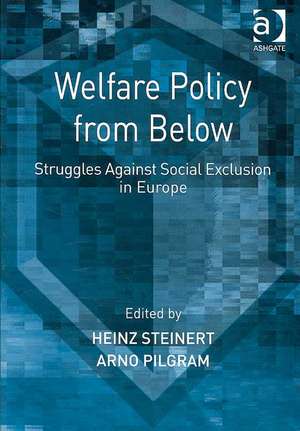Welfare Policy from Below: Struggles Against Social Exclusion in Europe
Autor Arno Pilgram Editat de Heinz Steinerten Limba Engleză Paperback – 28 dec 2006
Preț: 209.80 lei
Preț vechi: 245.87 lei
-15% Nou
Puncte Express: 315
Preț estimativ în valută:
40.15€ • 41.81$ • 33.93£
40.15€ • 41.81$ • 33.93£
Comandă specială
Livrare economică 14-28 februarie
Doresc să fiu notificat când acest titlu va fi disponibil:
Se trimite...
Preluare comenzi: 021 569.72.76
Specificații
ISBN-13: 9780754648154
ISBN-10: 075464815X
Pagini: 316
Dimensiuni: 153 x 219 x 19 mm
Greutate: 0.45 kg
Ediția:1
Editura: Taylor & Francis
Colecția Routledge
Locul publicării:Oxford, United Kingdom
ISBN-10: 075464815X
Pagini: 316
Dimensiuni: 153 x 219 x 19 mm
Greutate: 0.45 kg
Ediția:1
Editura: Taylor & Francis
Colecția Routledge
Locul publicării:Oxford, United Kingdom
Cuprins
Contents: Introduction: the cultures of welfare and exclusion, Heinz Steinert. The Project Framework: Limits of market society: European perspectives, Ian Taylor; Inclusion, exclusion: towards a dynamic approach, Georg Vobruba; Social exclusion: strategies for coping with and avoiding it, Heinz Steinert. Conceptual and Theoretical Matters: Participation and social exclusion: a conceptual framework, Heinz Steinert; Towards understanding situations of social exclusion, Bridgette Wessels and Siep Miedema. The Presentation of Social Exclusion: Forms and Norms: Coping with social exclusion: from acceptance to indignation, Tomke Böhnisch and Helga Cremer-Schäfer; Normalization, symptoms and reductions of complexity: unsatisfactory accounts of unsatisfactory living, Gerhard Hanak. Coping and its Resources: The Welfare-Work-Family Mix: Welfare or what? conditions for coping within different socio-political structures: the examples of Sweden and Spain, Anita Rönneling and Àngela Gabàs i Gasa; Resources, coping and subjective experiences, Monia Giovannetti and Fabio Quassoli; The meaning of work and experiences of disqualification, Helga Cremer-Schäfer; Subsistence, Henrik Tham; (Ab)using the family, Tomke Böhnisch, Àngela Gabàs i Gasa, Monia Giovannetti and Fabio Quassoli. Coping and its Resources: The Usefulness and Widespread Absence of Community: Community, subculture, secondary association as a resource: patterns of association to counter exclusion and configured networks to manage exclusion, Bridgette Wessels; Innovative coping strategies and social resource structures, Siep Miedema and Janine Janssen; 'On the spot' experiences and perceptions of social exclusion: comparing local communities and urban settings, Gerhard Hanak. The Market and the Law: Limits of Coping: Infrastructure gaps: housing problems in Bologna and Frankfurt, Fabio Quassoli and Tomke Böhnisch; Legal exclusion and social exclusion: 'legal' and 'illegal' migrants, Inge Karazman-Morawetz and Anita Rönneling; Double difficulty: female and foreigner, Bridgette Wessels, Janine Janssen and Siep Miedema. Conclusions and Policy Implications: Welfare policies as resource management, Christa Pelikan, Arno Pilgram, Heinz Steinert and Georg Vobruba; Bibliography; Technical annex; Index.
Notă biografică
Heinz Steinert is Professor of Sociology at the J.W.Goethe-University Frankfurt am Main, Germany. Arno Pilgram is Director of the Institute for the Sociology of Law and Criminology, Vienna, Austria.
Recenzii
’This important book contains an original and significant comparative anthropology of social exclusion in contemporary Europe. The research accounts will inform both academic debate and the development of policy. Of particular importance are the distinctions made between inclusion and participation, and the argument that the latter rather than the former is the opposite of exclusion. The implication that public policy against exclusion must accept and endorse diversity in the achievement of participation is of great significance for all concerned with these issues.’ David Byrne, University of Durham, UK ’A rare interdisciplinary and comparative analysis of how people navigate the treacherous divides and frail bridges between market, family, community, and state in constructing their life strategies, Welfare Policy from Below enriches our understanding of the dynamics and experience of social inequality and marginality today. It will be of particular interest to all those, scholars, policy makers and citizens, concerned with building a genuine social Europe.’ Loïc Wacquant, University of California, Berkeley, USA ’This study relies on dynamic, qualitative and comparative approaches and offers researchers as well as policy makers valuable insights into how social exclusion works and how to overcome it via a mix of resources, be they individual, institutional or network based. All essays partake in the common frame of pleading for a new vision for the European welfare state: We need a shift from a "logic of security based on entitlements to a "logic of participation founded on an unconditional provision of the basic resources.’ Stephan Leibfried, Co-director and Petra Buhr, Assistant Professor, University of Bremen, Germany ’The importance of the perspectives of the socially excluded is frequently acknowledged in other studies, but this book breaks new ground in accessing those perspectives and exploring them so thoroughly
Descriere
The future European system of social security and welfare is in need of a new perspective. Invigorating and informative, this book contributes to developing this new form of 'social exclusion knowledge' thanks to its conceptual and theoretical framework and its comparative empirical studies in eight European cities between Bologna and Stockholm.
